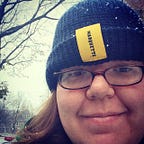Sex and Gender Through The Ages: Undergraduate Featured Research
Taylor Becker, Kelly O’Malley, and Sam Van Rens were all in Dr. Dawne Moon’s Sociology of Sex and Gender course at Marquette University this semester and teamed up to create a digital media project that would explore the ways people think about gender at different ages in their lives and different times in contemporary history. They decided to film family and friends responding to questions that prompted reflection on the ways gender constructs and norms had affected their lives and their experiences.
Dr. Moon’s entire class came to the Digital Scholarship Lab early in the term for an in-depth informative session on the software and equipment available to use for digital media projects. And they had a follow-up near the end of the semester to familiarize themselves with Medium’s platform where the course’s final projects would be posted. Between the info session and previous experience working with Macs and iMovie, the group was well-prepared to begin working on their project. To film their segments, each of the students checked out recording equipment (digital video recorders and tripods) and arranged to record their interviews on their own before getting together to edit the raw footage into a longer video a Mac and iMovie. When they were satisfied with the order of the video, they selected a song and imported it to play under the dialogue, and then added transitions, color effects, and title cards to help contextualize the flow of their content.
Creating a digital media project is different than writing a paper or taking a test for a final exam. There are similarities — studying, research, putting together a thesis that’s well-supported with evidence — but there are a lot of differences too. Some pros, as the group explains:
[Choosing to make a video] was great because it gave us the freedom to present the topics we discussed in a unique way that was also interesting. The video gave us a chance to involve our friends and family in the process and ask them questions that we might not usually talk to them about.
The group also found the process as a whole much more enjoyable than, say, writing a paper. The ability to engage with the topic together as well as collaborating in the editing process — choosing which clips to feature and which to cut — made something that might have been stressful into a fun interactive experience for them.
Of course, a professor doesn’t assign a project like this without reason. And as Taylor, Kelly, and Sam found out, there were lessons to learn as they went about the process of creating their digital media project. Perhaps the biggest thing they learned was that making a 20+ minute video to present to their class was no easy feat. Even though their class orientation to the Digital Scholarship Lab and their previous experiences with the software made the process of filming and editing easier, recording the raw footage was only half the work. They still had to edit all the footage together to create a coherent and concise narrative that reflected the topic they were looking to illuminate, and then add music, insert visual special effects like transitions, and more.
Another lesson the group learned was how to interview their subjects. When reflecting on the interview process, the group noted that it was often hard to get in-depth responses from the interviewees. If they had to do it again, they said:
“[It] would be beneficial to go through the questions with our participants first so they have a little time to think about how they are going to answer, so the responses could be more detailed.”
At the end of the semester, their project completed and turned in, the group really seems to have enjoyed the process of creating a digital media project for Dr. Moon’s class. And they would encourage others to consider doing this kind of project as well. But, they advise anyone thinking about it, “not without careful planning and taking the time to get to know the equipment and software [you’ll] be working with.”
The group would like to:
“Thank all of our participants for answering our questions openly and honestly, our classmates for instigating thought provoking discussions about these topics each class period, and Dr. Moon for giving us the opportunity to be creative with this final assignment.”
We would like to thank Taylor, Kelly, and Sam for sharing their work with us and congratulate them on their excellent digital media project. We found their video both informative and exceptionally well-done.
The Digital Scholarship Lab is here to support these kind of digital scholarship projects through information and Lab orientation sessions, media consults, in-person tutor help (M-Th, 4–8 pm), and more. If you’re interested in working on a digital media project for your class, make sure to schedule a consult with us to see how the Lab can help!
